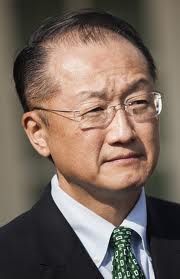World Bank President Dr. Jim Yong Kim has said that Nigeria ranks 152 out of the 157 countries in the world in human development index. Answering reporters questions on Nigeria at the opening press conference of the 2018 IMF/World Bank Group Annual Meetings in Bali Indonesia, Kim said “Nigerian unfortunately ranks 152 out of 157 countries in Human Development Index. We provide quite a bit of support for Nigeria in terms of the health budget. But we feel that the overall spending on health is just far too low, 0.076 per cent of GDP. And also the educational outcomes in Nigeria are very very poor.
“Nigeria is one of the most important countries not only in but in the world. And so we feel that it will be extremely important for Nigeria to really go on a different level all together in terms of their commitment to investing in human capital. Many African countries are in the red zones, if you see table two in the human capital project, you know, let me put it this way, I think that the World Bank has to take some responsibility for having emphasised hard infrastructure, roads, rails, energy, for a very long time. And you know that changed 20 years ago. But there has still been the bias that says “you know we will invest in hard infrastructure and then when we grow rich, we will have enough money to invest in health and education.
“We are now saying that that is really the wrong approach, that you have got to start investing in your people right now and not least of which, of all the reasons why you need to do that, the rapid change in technology, the fact that many low skill jobs will be eliminated. No body is quite sure how long that will take. But a child born today, in 20 years almost certainly many of the low skill jobs today will be gone. The requirement for this child to be able to learn throughout his or her entire life is simply going to get higher. The requirement, the needs are going to get higher and higher. This is a very loud and strong message to Africa.
“Africa needs to invest more in health and education. Luckily, because our IDAR, our fund for the poorest countries, is 50 per cent larger than it was three years ago because we have more financing, we can provide more support for African countries. The message here is that Heads of State and Ministers of Finance have to take responsibility. There is so much waiting for grants to come. You know, we will wait and the activists will help us and they will tell the donors we need more money, we need more money. What happened is in many African if they do not receive grant-based financing they just simply do not spend on health and education. So we hope that this is a loud wake-up call for leaders throughout the African continent, and especially in Nigeria”.
A New World Bank research released in Bali Jakarta gives policymakers compelling evidence that delivering better outcomes in children’s health and learning can significantly boost the incomes of people—and of countries—with returns far into the future. This is coming on the heels of the recent report that Nigeria has the largest number of children in the world who are not being educated. About 13.5 million children of school age are said to be out of school in Nigeria. A Human Capital Index, launched at the World Bank-IMF Annual Meetings, shows that 56 per cent of children born today across the world will lose more than half their potential lifetime earnings because governments are not currently making effective investments in their people to ensure a healthy, educated, and resilient population ready for the workplace of the future. The report indicates that Human capital which is the knowledge, skills, and health that people accumulate over their lives has been a key factor behind the sustained economic growth and poverty reduction rates of many countries in the 20th century, especially East Asia. World Bank Group President Jim Yong Kim said “For the poorest people, human capital is often the only capital they have. Human capital is a key driver of sustainable, inclusive economic growth, but investing in health and education has not gotten the attention it deserves. This index creates a direct line between improving outcomes in health and education, productivity, and economic growth. I hope that it drives countries to take urgent action and invest more – and more effectively – in their people.
“The bar is rising for everyone,” Kim added. “Building human capital is critical for all countries, at all income levels, to compete in the economy of the future.” The Human Capital Index measures the amount of human capital that a child born today can expect to attain by age 18, given the risks of poor health and education that prevail in the country where he or she lives. The Index measures each country’s distance to the frontier of complete education and full health for a child born today. The measure includes; survival – will children born today survive to school age? School – how much schooling will they complete and how much will they learn? Health – will they leave school in good health, ready for further learning and/or work as adults?

